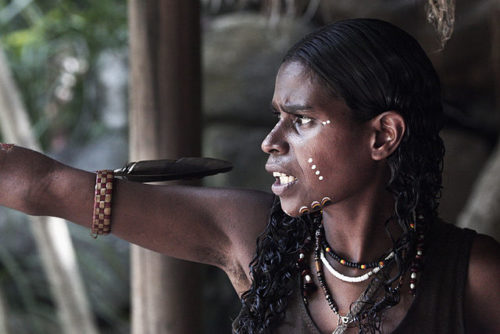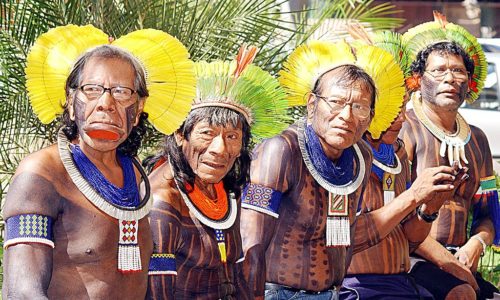Difference Between Aboriginal and Indigenous

Australia Aboriginal Culture
Aboriginal vs. Indigenous
Most of the time, we pertain to people who have not embraced urbanization and all other aspects of modern society as aboriginal, native, indigenous, fourth world cultures, or first people. These terms are mostly one and the same; however, as language and political qualifications progress, these seemingly synonymous words develop their own meanings and criteria. In other words, aboriginal and indigenous suddenly vary in connotation.
Looking it up in the dictionary, the word ‘indigenous’ pertains to that ‘originating and living or occurring naturally in an area or environment’. What makes it distinct is that it is actually considered a positive and politically correct term for describing natives. The United Nations itself and its subsidiary organizations put preference on the term among many other synonyms as it has maintained a definite list of criteria that clears out any intentions of discrimination or oppression. In biogeography and ecology, ‘a species is defined indigenous if its presence in that region is the result of only natural processes, with no human intervention.’ In essence, it doesn’t limit its meaning to define a community of people; it can also concern other organisms like plants, animals, and even terrestrial formation in a specific region. With regard to communities of people, not only are they endemic to their original territories, but they also claim cultural affinity, historical continuity, and sometimes, guardianship to their lands. Even before urbanization and industrialization that are mostly associated with Western influence, these communities have established and developed a society with a sustainable lifestyle, a ruling class, an economy, etc. Technically, the contemporary criteria for ‘indigenous people’ include groups:

Indigenous group of the Kaiapos tribe
1) Before subsequent colonization or annexation,
2) Alongside other cultural groups during the formation and/or reign of a colony or state,
3) Independent or largely isolated from the influence of the claimed governance by a nation-state,
4) Maintaining at least in part their distinct cultural, social, and linguistic characteristics, and remaining differentiated from the surrounding populations and dominant culture of the nation-state,
5) Self-identified as indigenous or recognized as such by external groups. Examples of indigenous communities are the Huli of Papua New Guinea, Chamorros of Guam, Sami of Norway, Kayapo of Brazil, and Aeta of the Philippines.
On the other hand, the term ‘aboriginal’ shares a very similar dictionary definition with the word ‘indigenous’. It is defined as ‘having existed in a region from the beginning’ and ‘relating to the indigenous peoples of Australia.’ Put simply, it can be used an adjective generally referring to natives, or a proper noun, particularly a subclass to identify the Australia-based indigenous communities. On a political level, however, the term ‘aboriginal’ or ‘aborigine’ has gained a negative, derogatory implication due to the term’s historical link with colonialism. Today, the broad, widely accepted meaning of the term Aborigine encapsulates the indigenous people of Australia. However, put in one grand classification, these communities remain very much different from one another in terms of local language and culture. Some of the omnifarious Aboriginal Australians are the Nunga, Tiwi, Koori, Murri, and Yamatji.
Summary
1) Used as adjectives, the terms ‘aboriginal’ and ‘indigenous’ share similar definitions – they pertain pertaining to people originating and occurring in a specific area.
2) Although the two terms are synonymous, ‘indigenous’ is preferred to ‘aboriginal’ as the former has established acceptable definite criteria and is considered politically correct, while the latter is deemed offensive due to its association with colonization.
3) ‘Indigenous’ is the expansive classification of communities that claim a historical continuity and cultural affinity with societies native to their original territories. Aboriginal people, on the other hand, are a subclass encircling the different indigenous communities based in Australia.
- Differences Between Fraternity And Sorority - January 8, 2014
- Differences Between Lucite and Plastic - January 7, 2014
- Differences Between Oil and Butter - January 6, 2014
Search DifferenceBetween.net :
 Email This Post
: If you like this article or our site. Please spread the word. Share it with your friends/family.
Email This Post
: If you like this article or our site. Please spread the word. Share it with your friends/family.
5 Comments
Leave a Response
References :
[0]https://commons.wikimedia.org/wiki/File:Australia_Aboriginal_Culture_002_(5447678025).jpg
[1]https://commons.wikimedia.org/wiki/File:Kaiapos.jpeg


Generally the adjective “Aboriginal” does not carry the same negative baggage in Canada as the noun “Aborigine” does in Australia.
Hmm…
While I can see what you are trying to get at here, in fact as the previous commentor pointed out, the word ‘Aboriginal’ is not considered offensive to other indigenous people, nor is it in indigenous Australian communities when used as an adjective. On the other hand, calling anyone an ‘Aborigine’ is antiquated at best, racist at worst, and objectifying in any event.
I would also point out that just because the United Nations has a preference for a term, that doesn’t make it the preferred nomenclature. I would always suggest simply calling people what they ask you to call them. This often is different than what powerful international institutions, well-intended though they may be, might use. In fact, many American Indians (what many well-intended white people like to call Native Americans) have complained that even their own formally recognized tribal names are actually those forced on them by colonizers, NOT what they themselves used to use.
Food for thought.
I am just curious why is the term Aborigine directly referred to the Australian Aborigines?
As an Englishman born in Victoria, I want my, i.e.our British Birthright back. I am a native Victorian,and therefore I consider that if I use that to me new word ‘indigenous’, I am indigenous toVictoria, Australia. Those whose ancestors were here before 1788 ar aborigines.
However the notorious agitators and proto-traitors , supported by ost of the media, have decided to so misuse words that one must now call aboriginees “indigenous” and blame all of today’s generation of non-aboriginal Australians forthe way many aboriginal Australians are treating themselves.
Some Aboriginal leaders want a new Apartheid, where by the 3 or 4% of aborigines want to own the whole Australia and to control the other 96 or 97 % of Australia.
I want all the subjects of our Queen tohave one common nationality, citizenship and passport, under our inherited “English”law.
The “Welcome to Country”speeches made so often now by persons claiming to be aboriginal are a wicked nonsense. This is not now “their”country, it is our country. It is as much mine as their’s and as such I take offence at being welcomed to mine own country.
Australia’s leaders, from the Throne down have betrayed the vast majority of the population.
When PEOPLE of any region of this world hear the words, “SUBCLASS”, “SUBCLASSES” many immediately, become offended or insulted. As we know sub, means below attach culture on to it. Wonder who invented this word?? In my opinion, the word, “RACISM” “THE CHILD IS A “BASTARD”, “CHECKING BOXES AS, “BLACK” “WHITE” AND MANY OTHERS. In my opinion, these words are meant to devalue a person or PEOPLE. Nobody is better off for doing it ❤